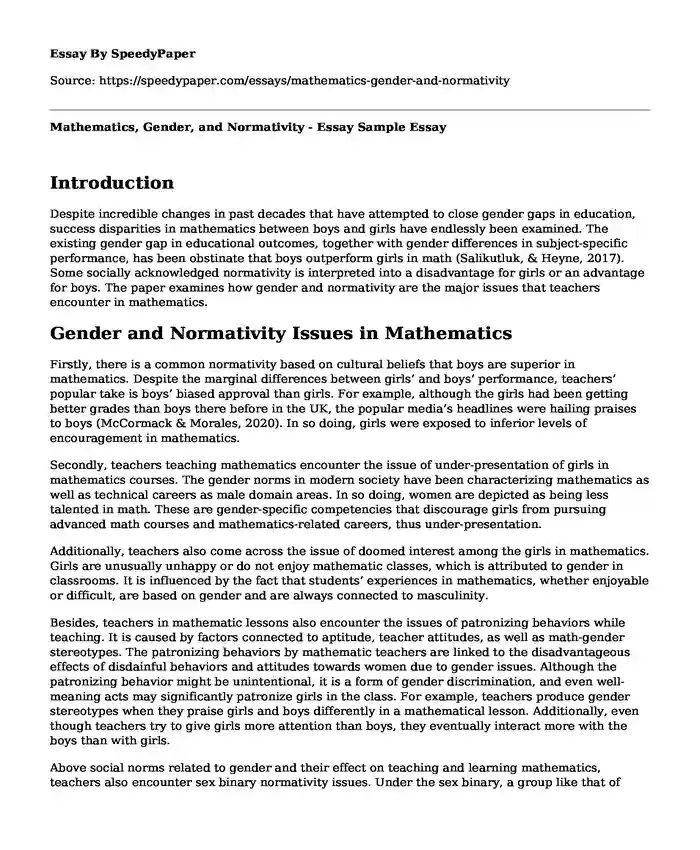
| Type of paper: | Essay |
| Categories: | Gender Science Mathematics |
| Pages: | 3 |
| Wordcount: | 656 words |
Introduction
Despite incredible changes in past decades that have attempted to close gender gaps in education, success disparities in mathematics between boys and girls have endlessly been examined. The existing gender gap in educational outcomes, together with gender differences in subject-specific performance, has been obstinate that boys outperform girls in math (Salikutluk, & Heyne, 2017). Some socially acknowledged normativity is interpreted into a disadvantage for girls or an advantage for boys. The paper examines how gender and normativity are the major issues that teachers encounter in mathematics.
Gender and Normativity Issues in Mathematics
Firstly, there is a common normativity based on cultural beliefs that boys are superior in mathematics. Despite the marginal differences between girls’ and boys’ performance, teachers’ popular take is boys’ biased approval than girls. For example, although the girls had been getting better grades than boys there before in the UK, the popular media’s headlines were hailing praises to boys (McCormack & Morales, 2020). In so doing, girls were exposed to inferior levels of encouragement in mathematics.
Secondly, teachers teaching mathematics encounter the issue of under-presentation of girls in mathematics courses. The gender norms in modern society have been characterizing mathematics as well as technical careers as male domain areas. In so doing, women are depicted as being less talented in math. These are gender-specific competencies that discourage girls from pursuing advanced math courses and mathematics-related careers, thus under-presentation.
Additionally, teachers also come across the issue of doomed interest among the girls in mathematics. Girls are unusually unhappy or do not enjoy mathematic classes, which is attributed to gender in classrooms. It is influenced by the fact that students’ experiences in mathematics, whether enjoyable or difficult, are based on gender and are always connected to masculinity.
Besides, teachers in mathematic lessons also encounter the issues of patronizing behaviors while teaching. It is caused by factors connected to aptitude, teacher attitudes, as well as math-gender stereotypes. The patronizing behaviors by mathematic teachers are linked to the disadvantageous effects of disdainful behaviors and attitudes towards women due to gender issues. Although the patronizing behavior might be unintentional, it is a form of gender discrimination, and even well-meaning acts may significantly patronize girls in the class. For example, teachers produce gender stereotypes when they praise girls and boys differently in a mathematical lesson. Additionally, even though teachers try to give girls more attention than boys, they eventually interact more with the boys than with girls.
Above social norms related to gender and their effect on teaching and learning mathematics, teachers also encounter sex binary normativity issues. Under the sex binary, a group like that of intersex people is excluded. As a result, such excluded groups of trans people from sex binary face barriers to joining advanced courses in mathematics and science, technology, engineering, and mathematics (STEM) (McCormack & Morales, 2020). The groups will thus be under-presented in mathematic classes. Consequently, these people experience medical and social-gendered issues, thus under-presented in mathematic courses since teachers cannot mitigate their representation.
Conclusion
The discussion above confirms the expected effects of the student’s gender roles and normativity, as encountered by mathematics teachers. Boys are taken as superior to girls in mathematics, which discourage girls. There are a few girls in the advanced mathematic course since the subject is based on gender-specific competencies. Girls are less happy when compared to boys in learning mathematics. There is the issue of unintended patronizing behaviors among the teachers as attributed to gender stereotyping. Sex binary issues exclude trans people who are under-represented in STEM due to social-gendered issues.
Reference
McCormack, M., & Morales, L. E. (2020). Mathematics, gender, and normativity. In Debates in Mathematics Education (pp. 89-100). Routledge.
Salikutluk, Z., & Heyne, S. (2017). Do gender roles and norms affect performance in math? The impact of adolescents’ and their peers’ gender conceptions on math grades. European Sociological Review, 33(3), 368-381. https://doi.org/10.1093/esr/jcx049
Cite this page
Mathematics, Gender, and Normativity - Essay Sample. (2024, Jan 03). Retrieved from https://speedypaper.net/essays/mathematics-gender-and-normativity
Request Removal
If you are the original author of this essay and no longer wish to have it published on the SpeedyPaper website, please click below to request its removal:
- Gravity Begins with Aristotle and Ends with Einstein, Free Essay
- Essay Sample on Sex Exploitation in the UK
- Research of the Short Story Unaccustomed Earth - Essay Sample
- Free Essay: American Dream and the Immigration
- Free Essay. Visual Analysis of Paul Cezanne's Still Life with Apples 1895-98
- China and Market Reform: Paper Example
- Decoding Age Discrimination: From Claims to Defenses - Paper Sample
Popular categories




